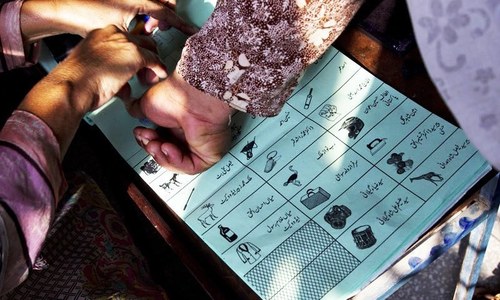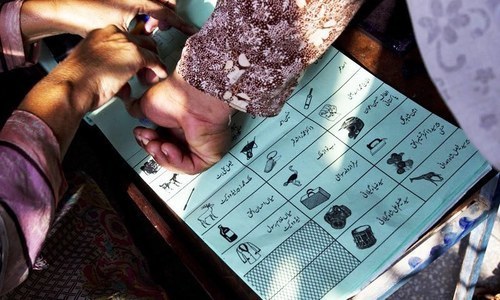ISLAMABAD: There are as many as 12 National Assembly constituencies in three provinces of the country where the percentage of women voters is less than 41 per cent.
Six of such constituencies are in Khyber Pakhtunkhwa, four in Sindh and two in Balochistan.
A thorough analysis of the constituency-wise data of voters posted by the Election Commission of Pakistan (ECP) on its website shows that the situation in NA-50 (South Waziristan) is the worst as the gap there between male and female voters exceeds the total number of women enrolled as voters.
The number of male and female voters in the constituency is 122,563 (68.16pc) and 56,733 (31.64pc), respectively; the gender gap, therefore, comes to 65,830.
Difference in NA-50 greater than the total number of women voters
The second worst case is that of NA-263 (Killa Abdullah) in Balochistan where the number of registered men on the electoral roles is 189,419 (64.17pc) against a total of 105,747 (35.83pc) women, which translates into a gap of 83,672.
In NA-48 (North Waziristan) the number of male voters is 220,765 (61.93pc) against 115,687 (38.07pc) female voters, the gap coming to 85,078.
In Mohmand NA-42 the number of male and female voters is 284,519 (61.02pc) and 117,856, respectively, the difference working out to 66,663.
Similarly, in NA-51 (Frontier Regions) the number of male voters is 123,334 (60.54pc) and that of female voters 80,401 (39.46pc). The gap thus comes to 42,933.
The number of men on the electoral roles in NA-250 (Karachi West III) is 242,237 (69.02pc) and that of women 164 674 (39.98pc), the gap working out to 82,583.
In NA-264 (Quetta I) the number of male and female voters is 115,693 (59.66pc) and 77,578 (40.14pc), respectively. The gap between them, therefore, comes to 38,114.
In NA-249 (Karachi West II) the number of registered male voters is 197,612 (59.61pc) and that of women voters 133,877 (40.39pc), with the gap coming to 63,735.
In NA-7 (Lower Dir II) the number of male and female voters is 218,479 (59.45pc) and 149,026 (40.55pc), respectively; the gap is therefore 69,453.
Likewise, in NA-238 (Malir III) the number of male voters is 137,926 (59.39pc) and that of women voters 94,311, with the gap coming to 43,615.
The NA-5 (Upper Dir) constituency has the largest difference of 93,991 between male and female voters. The number of male voters there is 299,665 (59.3pc) against 205,674 (40.70pc) women voters.
In NA-248 (Karachi-West I) the number of male voters is 177,225 (59.21pc) and that of women 122,067 (40.69pc), with the gap coming to 55,158.
In all there are 104, out of the 272 National Assembly constituencies, which have a difference of over 50,000 between male and female voters. These include 60 of the 141 constituencies in Punjab, 28 of the 51 in Khyber Pakhtunkhwa, 13 of the 61 in Sindh, and three of the 16 in Balochistan.
In as many as 11 of these constituencies, the difference is over 70,000. These are NA-5 Upper Dir (93,991); NA-48 North Waziristan (85,078); NA-263 Killa Abdullah (83,672); NA-250 Karachi West III (82,563); NA-87 Hafizabad I (82,550); NA-122 Sheikhupura IV (78,394); NA-35 Bannu (73,500); NA-246 Karachi South I (73,330); NA-77 Narowal I (71,630); NA-259 Dera Bugti (71,466); and NA-138 Kasur II (70,936).
In contrast there are 20 National Assembly constituencies where the proportion of female voters is over 47pc. These include all the three constituencies of the federal capital; the rest of 17 such constituencies are in Punjab.
None of the other provinces has a single constituency where the percentage of women voters is more than 47pc.
All the seven constituencies in Rawalpindi are on the list. All the constituencies of Chakwal, Attock, Jhelum and Khushab, having two National Assembly seats each, also have the distinction of having a proportion of female voters of over 47pc.
NA-64 and NA-65 of Chakwal have 49.32pc and 48.60pc registered female voters, respectively. In NA-64, the number of male voters is 294,150 (50.58pc) against 286,278 (49.32pc) women voters, showing a difference of 7,872 (1.36pc).
In NA-65, the total number of male and female voters is 303,684 (51.4pc) and 287,133 (48.6pc), respectively. In NA-61 (Rawalpindi-V), there are 205,480 (51.48pc) male voters and 193,627 (48.52pc) female voters.
In NA-58 (Rawalpindi-II), the number of male and female voters is 346,297 (51.66pc) and 324,065 (48.34pc), respectively.
Likewise, in NA-66 (Jhelum-I), the number of male and female voters is 300,892 (51.70pc) and 281,068 (48.3pc). respectively.
In NA-56 (Attock-II), the number of male voters is 353,687 (52.06pc) against 325,703 (47.94pc) female voters.
NA-130 is the only NA constituency out of the 14 in Lahore to boast a proportion of female voters of more than 47pc. The number of male and female voters in this constituency is 294,276 (52.11pc) and 270,470 (47.89pc), respectively.
The other constituencies where the percentage of female voters is more than 47pc are NA-54 Islamabad-III (47.84pc); NA-60 Rawalpindi-IV (47.76pc); NA-93 Khushab-I (47.65pc); NA-57 Rawalpindi-I (47.64pc); NA-63 Rawalpindi-VIII (47.63pc); NA-67 Jhelum-II (47.57pc); NA-53 Islamabad-II and NA-59 Rawalpindi-III (57.54pc); NA-62 Rawalpindi-VI (47.51pc); NA-52 Islamabad-I (47.47pc); NA-55 Attock-I (47.3pc); NA-94 Khushab (47.13pc); and NA-71 Gujrat-IV (47.09pc).
Published in Dawn, December 28th, 2020















































